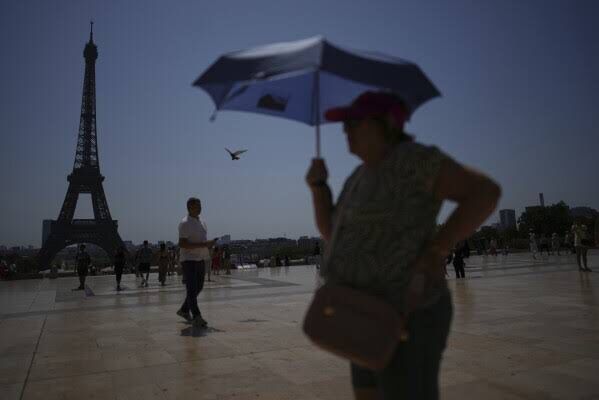
Climate change amplifies heat wave death toll in Europe, researchers warn. Image: AP News.
(The Post News)– After a severe heatwave hit Europe, scientists quickly analyzed its impact. They estimated how many deaths might have been caused or worsened by climate change.
This study was a new approach to understanding heat wave deaths linked to climate change. Researchers used historical temperature data to estimate the number of excess deaths. The scientists found that climate change might have tripled the number of deaths during the heat wave. They based this on temperature data and mortality trends.
Since exact death numbers aren’t available yet, researchers used historical data to estimate the impact. They focused on the hottest 5-day period in each city. Friederike Otto, a climate scientist, emphasized that the numbers represent real lives lost due to extreme heat. The study aimed to understand the role of climate change.
By comparing temperatures with and without climate change, scientists estimated the number of deaths caused by climate change. They found that 1,500 out of 2,300 deaths could be linked to climate change. The study estimated that climate change caused around 1,500 extra deaths in 12 European cities. Without climate change, the death toll would have been around 770.
Ben Clarke, a researcher, noted that Europe would likely have experienced hot weather anyway. However, climate change made it significantly hotter and more deadly. Moreover, the report stated that global warming has increased temperatures by 1.3°C since pre-industrial times. During the heat wave, cities experienced temperatures 2-4°C hotter than they would have without climate change.
The researchers released their findings quickly to raise awareness about extreme heat dangers. They wanted to inform the public and policymakers while the issue was still relevant. Otto said that people are more likely to connect the dots between their experience and scientific evidence when the event is recent. Delaying the analysis would reduce its impact.
Another study found that when people link extreme weather to climate change, they’re more likely to support climate policies. This highlights the importance of raising awareness.
Heat-related deaths can be hard to quantify because they often exacerbate underlying health conditions. Most heat-related deaths occur out of public view and aren’t always reported. Garyfallos Konstantinoudis called heat waves “silent killers” because most heat-related deaths happen privately and aren’t always reported.
The study has some limitations that might affect the accuracy of the death toll estimate. These include the timing of the heat wave and adaptation strategies like air conditioning.
Kristie Ebi, an expert not involved in the study, said that while the exact death toll is uncertain, the study provides a solid indication of the magnitude of the impact. She believed the study’s findings and thought the number of heat-related deaths was likely an underestimate. She emphasized the importance of using this information to improve early warning systems and responses to heat waves, saving lives in the future.



